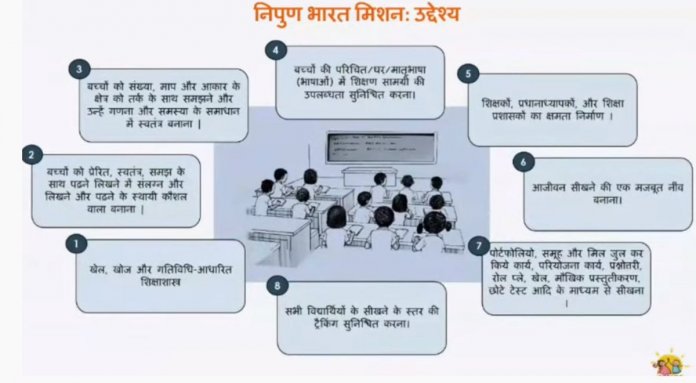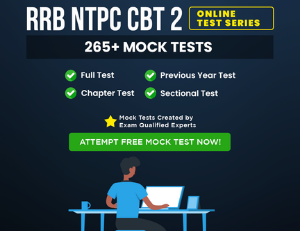The Government on 25 October 2021 formed the National Steering Committee (NSC) for the implementation of the NIPUN (National Initiative for Proficiency in Reading with Understanding and Numeracy) Bharat Mission.
Read further to know all about the mission, its significance and responsibilities of the committee.
NIPUN Bharat Mission
The Ministry of Education launched the NIPUN Bharat Programme on 5th July 2021. It aims to cover the learning needs of children in the age group of 3 to 9 years.
Part of NEP 2020
This initiative is being launched as a part of NEP (National Education Policy) 2020.
This policy aims to pave the way for transformational reforms in school and higher education systems in the country. This policy replaced the 34 year old National Policy on Education (NPE), 1986.
Objective
To create an enabling environment to ensure universal acquisition of foundational literacy and numeracy (FLN), so that every child achieves the desired learning competencies in reading, writing and numeracy by grade 3 by 2026-27.
The National Mission which has been launched under the aegis of the centrally sponsored scheme of Samagra Shiksha, will focus on providing access and retaining children in foundational years of schooling; teacher capacity building; development of high quality and diversified Student and Teacher Resources/Learning Materials; and tracking the progress of each child in achieving learning outcomes.
Students covered
The mission will focus on children of the age group of 3 to 9 years including preschool to Grade 3. The children who are in Class 4 and 5 and have not attained the foundational skills will be provided individual teacher guidance and support, peer support and age appropriate and supplementary graded learning materials to acquire the necessary competencies.
The goals and objectives of the mission are required to be achieved by all Govt., Govt. Aided and Private Schools so that universal acquisition of FLN skills can be achieved by 2026-27.
National Steering Committee
The newly-formed National Steering Committee to implement NIPUN Bharat will be chaired by the Union Education Minister Dharmendra Pradhan and Minister of State for Education Annapurna Devi will be the vice-chairperson.
Members of the Steering Committee
The other members of the NSC include: Secretary, School Education and Literacy; Director NCERT; Secretary Education Uttar Pradesh; Secretary Education, Karnataka; Director SCERT Gujarat and Director SCERT Sikkim.
Representatives of seven union ministries — Women and Child Development, Tribal Affairs, Social Justice and Empowerment, Health and Family Welfare, Finance, Electronics and Information Technology and Panchayati Raj; two experts from NCERT and RIE Ajmer; and three external experts will also be members of the committee.
Roles and Responsibilities of the Committee
The objective of the committee will be to oversee the progress of the National Mission on Foundational Literacy and Numeracy and provide guidance on policy issues and achieve the desired target in 2026-27. The committee will also review programmatic and financial norms periodically to ensure they are synchronised with targets to be achieved.
To disseminate tools for the measurement of yearly progress in the form of guidelines is one of the responsibilities of the NSC. It seeks to develop methodology of assessment to analyse the progress and provide feedback to States/UTs.
To prepare and approve a National Action Plan with KRA’s for every state/UT with respect to the factors attributed for the gaps (i.e., lack of Fund, Vacancies, Teachers, Demography, Local issues, Need of Training for teachers, Curriculum and pedagogy related).
Expected Outcomes
- Foundational skills enable to keep children in class thereby reducing the dropouts and improve transition rate from primary to upper primary and secondary stages.
- Activity based learning and a conducive learning environment will improve the quality of education.
- Innovative pedagogies such as toy-based and experiential learning will be used in classroom transactions thereby making learning a joyful and engaging activity.
- Intensive capacity building of teachers will make them empowered and provide greater autonomy for choosing the pedagogy.
- Holistic development of the child by focusing on different domains of development like physical and motor development, socio-emotional development, literacy and numeracy development, cognitive development, life skills etc. which are interrelated and interdependent, which will be reflected in a Holistic Progress Card.
- Children to achieve a steeper learning trajectory which may have positive impacts on later life outcomes and employment.
- Since almost every child attends early grades, therefore, focus at that stage will also benefit the socio-economic disadvantageous group thus ensuring access to equitable and inclusive quality education.
Stay tuned with hranker.com for more updates.




